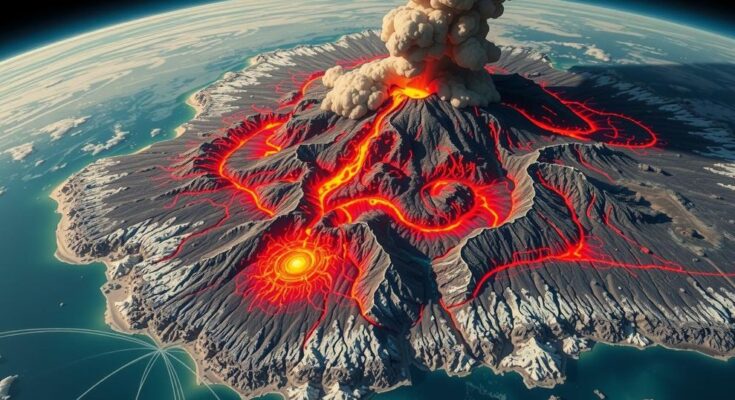A magnitude-5.8 earthquake struck Ethiopia near Addis Ababa on January 4, 2025, prompting evacuations due to eruptions at Mount Dofan Volcano. Geologists warn of potential increases in seismic and volcanic activity, raising concerns over the impact on the Renaissance Dam amid unresolved disputes between Ethiopia, Egypt, and Sudan regarding water rights.
On January 4, 2025, a substantial magnitude-5.8 earthquake occurred in Ethiopia, particularly affecting the regions surrounding Abomsa and Amhara close to the capital city of Addis Ababa. The earthquake’s epicenter was reported to be at a depth of 10 kilometers, as reported by the Ethiopia Geological Institute and the U.S. Geological Survey (USGS). Experts in the field of geology have expressed concerns that subsequent tremors may be more intense.
In the Afar region, the Mount Dofan Volcano has erupted, coinciding with reports of extensive ground fissures. The Ethiopian authorities have issued evacuation orders, relocating thousands of residents to temporary shelters as a precautionary measure. The potential for escalated seismic activity raises alarms, leading concerned geologists like Abbas Sheraqi to caution about the possibility of further tremors and volcanic activity impacting neighboring sites.
Additionally, Sheraqi has highlighted concerns regarding the Renaissance Dam, emphasizing that any structural issues could pose significant risks not only to Ethiopia but also to the surrounding nations, particularly Sudan. Ethiopia has been engaged in ongoing negotiations with Egypt and Sudan concerning water rights related to the Grand Ethiopian Renaissance Dam (GERD), a complex issue that has yet to achieve a satisfactory resolution for all parties involved. Despite various discussions, significant disagreements remain as Ethiopia continues dam operations without consensus from the downstream countries.
The recent seismic activity in Ethiopia has raised significant alarm, particularly given the vulnerability of the surrounding regions to geological disturbances. Earthquakes in this area have been increasing in magnitude, necessitating the urgent response from authorities. Additionally, the eruption of Mount Dofan Volcano further complicates the situation, prompting evacuations as large cracks in the ground signal potential hazards. This geological instability is compounded by ongoing tensions between Ethiopia, Egypt, and Sudan regarding the management and implications of the Grand Ethiopian Renaissance Dam, a critical infrastructure project that affects regional water rights and security.
In summary, the recent magnitude-5.8 earthquake in Ethiopia, alongside volcanic eruptions, signifies escalating geological events requiring immediate attention. The need for evacuation of residents underscores the urgency of the situation. Moreover, the geopolitical ramifications related to the GERD cannot be overlooked as the region faces heightened risks amidst longstanding water rights discussions. It remains vital for all involved nations to pursue cooperative measures to ensure stability and safety for their populations.
Original Source: www.egypttoday.com




